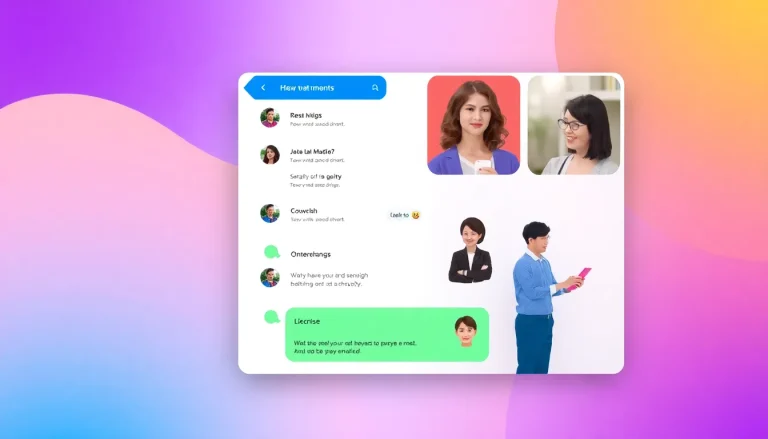
Understanding AI Sales Agents
What Are AI Sales Agents?
AI sales agents, often referred to as AI SDRs (Sales Development Representatives), are sophisticated software applications designed to automate various aspects of the sales process. Utilizing advances in artificial intelligence, these agents can perform tasks such as lead generation, prospect research, personalized communication, and follow-ups, often with minimal human involvement. Essentially, AI sales agents function as an extension of a sales team, enhancing productivity and efficiency. The growing demand for AI sales agents is indicative of the broader shift towards automation and AI integration across business processes.
Functions and Use Cases
AI sales agents perform a myriad of functions that streamline the sales process. Key use cases include:
- Lead Generation: AI agents can scour vast amounts of data to identify potential leads, utilizing criteria set by sales teams to discover qualified prospects.
- Personalized Outreach: By employing natural language processing (NLP) and machine learning (ML), AI sales agents can draft personalized emails and messages tailored to the interests and needs of individual prospects.
- CRM Management: Many AI sales agents integrate with CRM systems to update records, log interactions, and maintain accurate data, reducing the burden on human sales representatives.
- Scheduling Meetings: AI assistants can handle scheduling by communicating with clients and prospects to find suitable times for meetings, thus freeing up valuable time for sales teams.
Benefits for Businesses
The integration of AI sales agents yields several distinct advantages for businesses, including:
- Increased Efficiency: AI agents handle repetitive tasks, allowing human sales representatives to focus on more strategic activities.
- Quantifiable Insights: AI systems analyze interaction data to provide insights and trends, enabling teams to refine their sales strategies.
- Scalability: AI agents can manage thousands of interactions simultaneously, allowing businesses to scale their outreach efforts without proportionately increasing headcount.
- Improved Customer Experience: Prompt and personalized engagements foster better relationships with potential clients, ultimately leading to higher conversion rates.
The Evolution of Sales Technology
From Traditional Sales to AI-Driven Solutions
The sales landscape has transformed dramatically over the past few decades. Traditional methods that relied heavily on Face-to-Face interactions and manual tracking have gradually shifted toward technology-driven solutions. The introduction of CRM systems revolutionized how businesses managed customer relationships, but the next evolution has been the utilization of AI.
Today, AI-driven sales solutions provide advanced analytics, predictive modeling, and automated processes that not only save time but also enhance the quality of interactions. As we continue embracing automation, AI sales agents stand at the forefront of this evolution, redefining sales effectiveness.
Comparing AI Sales Agents with Human Sales Teams
While AI sales agents offer remarkable capabilities, it’s important to acknowledge their complementary role alongside human sales teams. Unlike AI, human agents possess emotional intelligence, empathy, and nuanced understanding that cannot be truly replicated by machines. Here’s a comparison of strengths:
- AI Sales Agents: Consistent, scalable, and able to process vast data quickly. They excel at routine tasks and can operate 24/7 without fatigue.
- Human Sales Representatives: Ability to establish genuine relationships, navigate complex negotiations, and understand deeper emotional cues from clients.
The most effective sales strategies will leverage both AI agents and human sales representatives to create a balanced approach tailored to the unique needs of their sales processes.
Market Trends and Projections
Recent studies point to a robust market growth trajectory for AI in sales. With advancements in machine learning and NLP, the global market for AI-driven sales tools is expected to reach upwards of $20 billion by 2025. Key trends shaping this growth include:
- Integration with CRM Systems: As businesses realize the value AI brings to data management, many are integrating AI sales agents directly into their existing CRM platforms.
- Specialized Solutions: There is a surge in demand for AI agents tailored for specific industries or functions, enabling more nuanced sales strategies.
- Real-Time Analytics: Businesses are increasingly seeking real-time insights that AI sales agents can provide, enhancing decision-making and actions based on immediate data.
Implementing AI Sales Agents
Choosing the Right AI Tools
Selecting the appropriate AI sales agent can be a daunting task given the plethora of options available in the market. Businesses should consider several factors:
- Functionality: The AI agent should align with the organization’s specific needs, such as lead generation, email automation, or CRM integration.
- Scalability: Ensure the chosen tools can grow with the business, adapting to increasing data and user needs without compromising performance.
- User Interface: A user-friendly interface enhances adoption rates among sales teams, minimizing the learning curve associated with new technologies.
- Support and Training: Opt for vendors that provide robust support and training resources to ensure the sales team can effectively utilize the technology.
Integration with Existing Sales Processes
Integrating AI sales agents into existing workflows is crucial for maximizing their potential. A few recommended steps include:
- Conduct a Needs Analysis: Identify specific pain points within the current sales process where AI could add value.
- Set Clear Objectives: Establish what success looks like, including KPIs to measure the effectiveness of the AI agent.
- Drive Adoption: Encourage staff buy-in through demonstrations and highlighting the benefits of streamlined workflows.
- Test and Iterate: Begin with a pilot program, collecting feedback, and refining processes based on performance data and user experience.
Measuring Effectiveness and ROI
To assess the impact of AI sales agents, businesses must employ measurable metrics that allow for concrete evaluations. Consider tracking the following:
- Lead Conversion Rates: Monitor how effectively leads generated by AI convert into sales compared to traditional methods.
- Time Savings: Analyze the time saved on tasks such as email outreach and follow-up communications.
- Revenue Generation: Examine any increase in revenue attributed directly to the integration of AI agents into the sales process.
- User Feedback: Regularly survey the sales team to understand how AI is impacting their workflow and productivity.
Challenges in AI Sales Deployment
Overcoming Resistance to Change
Introducing AI sales agents often meets with resistance from sales teams accustomed to traditional methods. To ease this transition:
- Educate Employees: Provide training sessions that emphasize the benefits of AI, illustrating how it enhances—not replaces—their roles.
- Foster a Culture of Innovation: Encourage a mindset that embraces change and experimentation, promoting the idea that adaptation is crucial for growth in a rapidly evolving market.
- Involve Teams in the Process: Allow sales team members to participate in the selection and implementation process, empowering them and giving a sense of ownership over the technology.
Data Security and Privacy Concerns
As businesses rely increasingly on AI for sales processes, data security and privacy have become paramount. Best practices include:
- Implementing Robust Security Protocols: Invest in security measures to protect sensitive customer data throughout the sales funnel.
- Compliance with Regulations: Ensure that all deployed solutions adhere to relevant data protection laws like GDPR or CCPA.
- Regular Audits: Conduct periodic reviews of data handling and storage practices to mitigate risks of data breaches or misuse.
Training and Support for Staff
Robust training programs are essential to ensure that sales representatives feel confident using AI technologies. Organizations should focus on:
- Comprehensive Training Programs: Provide detailed instructional resources and workshops to familiarize the sales team with AI tools.
- Continuous Support: Implement ongoing support channels such as help desks or dedicated team members who can assist with technological challenges.
- Encouragement of Best Practices: Share success stories within the company that highlight effective use of AI, promoting a culture of learning and adaptation.
The Future Landscape of Sales with AI Agents
Emerging Technologies in Sales
As technology continues to advance, the future of sales will likely see the integration of even more sophisticated solutions. Notable trends include:
- Predictive Analytics: Leveraging AI to anticipate customer behavior and needs, enabling proactive sales strategies.
- Voice Interactions: Integration of voice recognition technology to allow AI agents to interact using spoken language, making communications even more natural.
- Enhanced Personalization: AI will use deeper data insights to create hyper-personalization, tailoring interactions more finely to individual customer experiences.
Case Studies of Successful Implementations
Examining businesses that have successfully adopted AI sales agents provides valuable lessons. For example:
- Company X: After implementing an AI-driven lead generation tool, Company X reported a 30% increase in qualified leads and a significant reduction in hour’s spent on manual outreach.
- Company Y: Utilizing AI for scheduling meetings allowed Company Y to double their meeting frequency without adding additional staff, significantly boosting their sales pipeline.
These successes highlight not only the potential of AI solutions but also the vital importance of thorough implementation strategies that consider the unique dynamics of each business.
Predictions for the Next Decade
As AI continues to evolve, experts predict a transformative impact on the sales industry over the next decade. Some expected developments include:
- Widespread Adoption: Eventually, a vast majority of sales organizations will incorporate AI into their processes, standardizing the use of these agents across various stages of sales cycles.
- Increased Collaboration: We will see tighter collaboration between AI agents and human sales representatives, leading to hybrid models where both play complementary roles in engagement and closing deals.
- Innovation in AI Capabilities: Advanced machine learning algorithms will enhance the ability of AI agents to understand context and execute complex sales strategies effectively.
In conclusion, the rise of AI sales agents signals a pivotal change in the landscape of sales. Businesses that embrace these technologies will not only enhance their efficiency but will also improve their customer interactions, setting the stage for sustained competitive advantage in the evolving market. With effective implementation and strategic integration, AI sales agents will play a crucial role in shaping the future of sales.




